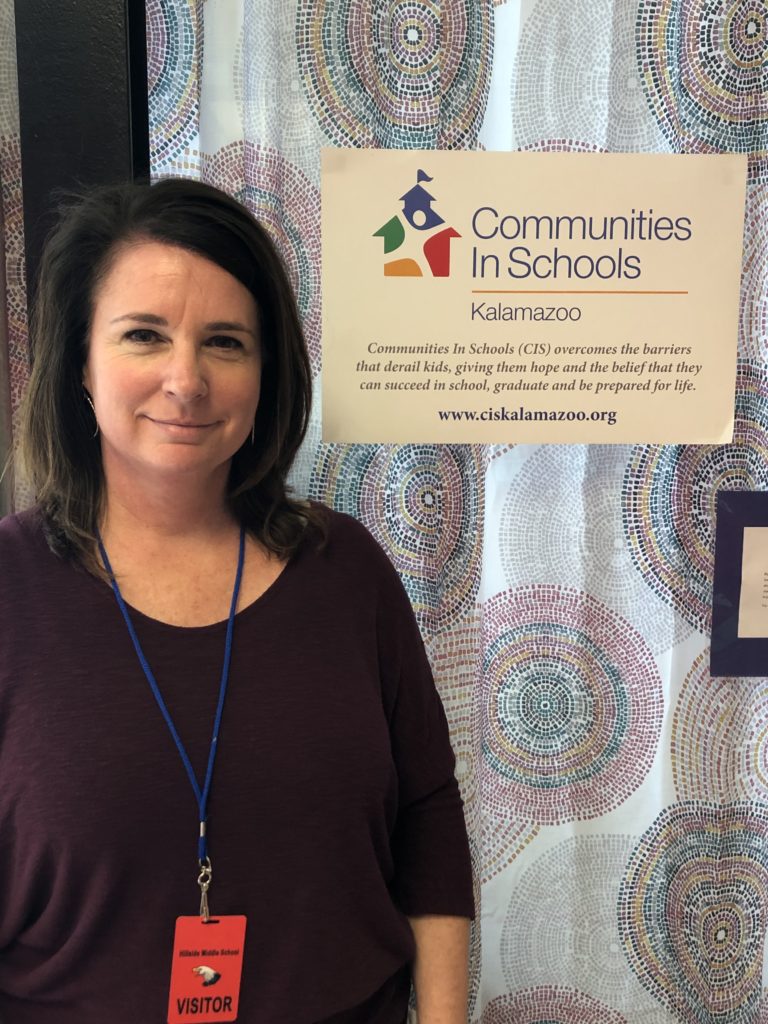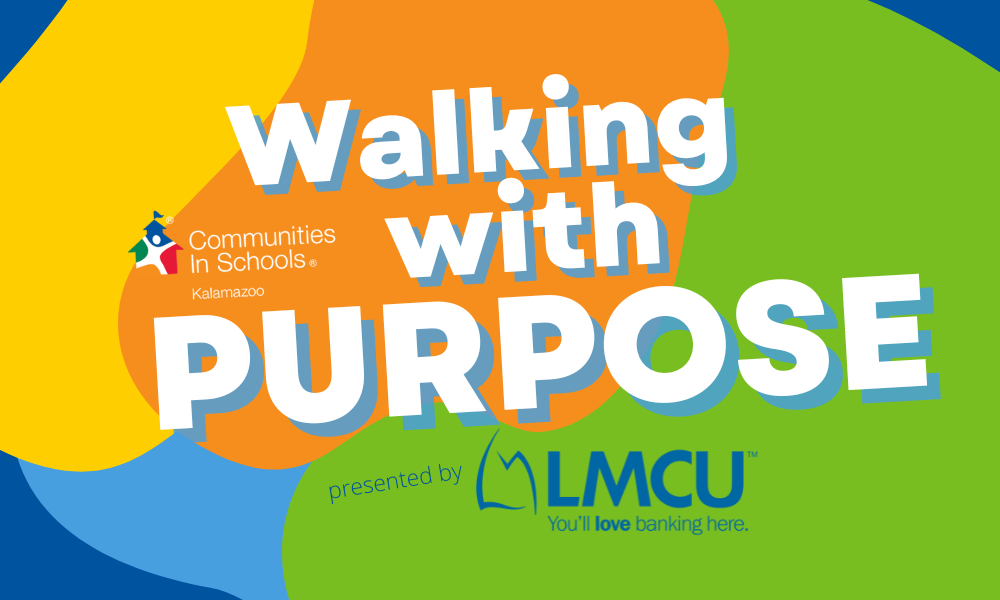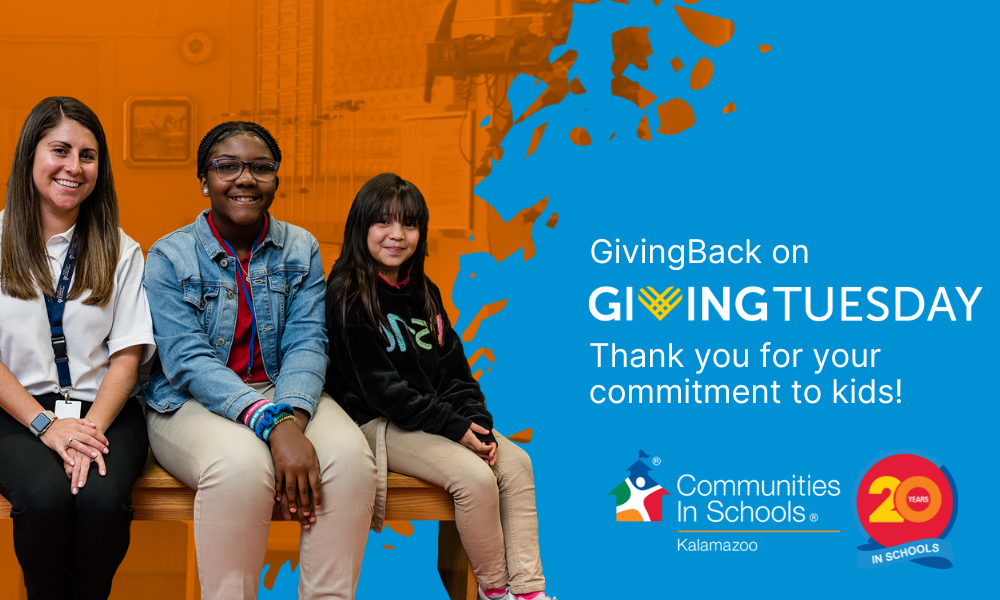Cate Jarvis: Built for Helping Kids in Schools
 Welcome back to the POP QUIZ! This is a regular, yet totally unexpected, feature where we ask students, parents, staff, our friends, and partners to answer a few questions about what they are learning, reading, and thinking about. Today we feature Cate Jarvis, School Grief Support Counselor.
Welcome back to the POP QUIZ! This is a regular, yet totally unexpected, feature where we ask students, parents, staff, our friends, and partners to answer a few questions about what they are learning, reading, and thinking about. Today we feature Cate Jarvis, School Grief Support Counselor.
Since 2006, CIS has been able to turn to Hospice Care of Southwest Michigan. From the beginning of this partnership, Cate Jarvis, one of Hospice’s School Grief Support Counselors, has been supporting grieving students. She runs eight-week sessions of “Grief 101” in seven to ten Kalamazoo Public School buildings each year. By the end of this school year, she will have held fall, winter, and spring sessions at Hillside Middle School, Kalamazoo Central High School, Loy Norrix High School, Lincoln International Studies School, Washington Writers’ Academy, Woods Lake Elementary, Parkwood Upjohn Elementary, Milwood Magnet Middle School, Woodward School for Technology and Research, and Prairie Ridge Elementary School.
Originally from Detroit, Cate was surprised to find she had made her way to Kalamazoo. “I grew up in the city of Detroit and everything was there,” she says. “I didn’t know that there was anything past Ann Arbor!” Cate holds degrees from Western Michigan University, a bachelor in Family Studies and Masters in WMU’s Counselor Education and Counseling Psychology. We met up with Cate at Walnut & Park Cafe in downtown Kalamazoo.
Alright, Cate Jarvis: pencil out, eyes on your own paper. Good luck.
Pop Quiz
There are many definitions of grief out there. Author and undertaker Thomas Lynch says, “Grief is the price we pay for being close to one another. If we want to avoid our grief, we simply avoid each other.” How do you define grief?
Grief is a natural process that you go through when you have lost someone or something. Not just death of loss of a loved one, but it could be losing one’s sense of safety and losing a sense of how one functions in the world due to a variety of things: incarceration, foster care, recent changes in home or school. Who am I going to be without this person? Who is going to take care of me? In that process of grieving, you can feel many different emotions, such as anger confusion, sadness, and relief.
Then why is it, when grief is a natural process, does it seems we have a tendency in this society to rush past or avoid grief? Even the very terms we use when referring to grief, like “get over it,” suggest we want to quickly brush it aside. Is this an accurate perception? If so, what do we lose out on by not fully embracing loss?
I think that’s an accurate perception. It’s not a comfortable subject to discuss, so often, people just don’t. What do we lose out on not embracing hope? That’s a good question. Two of the big one’s we potentially lose out on is resilience and the ability to be connected to other things and people. …We go through grief because we are connected.
When it comes to grief, you never get over it. You live with it. You let it be. Sometimes grief is going to be more and sometimes it’s going to be less.
What does a grieving child look like? How does grief manifest itself differently in children than in adults?
In kids, usually you see behaviors like withdrawing, sadness, and anger. They may appear worried and a lot of times you see an underlying agitation—they can’t sit still and may get frustrated easily. Adults can have these same behaviors but they have more life experience and cognitive ability to keep that contained. You may see crying with both kids and adults, as well as depression, substance abuse, a sense of hopeless, anxiety and worry, and a stressed-out presence.
With adults, they may believe that their grief will be a burden to someone. I see this in the teen years but not with the younger children. That makes sense: as we get older, we take in societal messages about how we should or should not express our grief. We learn that often people don’t know how to respond. And so, in some instances, we may try and keep that burden to ourselves.
How should we respond to someone who is grieving?
Acknowledge the loss. Acknowledging is better than not acknowledging it. Saying something is better than not saying anything at all.
In talking recently with a mother whose adult child is dying, I was reminded that grieving is hard work. She was exhausted. She mentioned that she could easily be consumed by her grief. One way she was trying to keep this from happening was consciously trying to be more child-like in the way she was dealing with her grief. You know, how sometimes kids seem to be sad one moment and then minutes later they are laughing and enjoying something. Grownups, on the other hand, may feel guilty. How is it that I can feel joy or happiness in this time of sadness?
Yes, kids can compartmentalize their grief. With grief, kids dip their toe in the water a bit. You might be giving a long explanation to a question they’ve asked about the loss they are experiencing and then they are like, So what’s for dinner? They process information differently than adults. Adults process it all the time, whereas kids are processing it in chunks of time.
… I like that idea of being childlike with grief, that’s probably very healthy. Giving yourself space, time, love, and self-care, it’s important to do that. People who are grieving need a break from grief.
As you’ve been working with children over the years, any surprising insights about loss or grief?
It’s surprising the amount of grief and losses that a young child or teenager experiences…It also makes you realize that we are made for it.
You’re saying we’re built for grief.
Think about it. Think of the losses you’ve experienced throughout your life. If you took those out, what would be left? I realize that’s a philosophical way to look at it, but it is stunning to consider how much loss our kids endure. It is endurance; it’s a marathon.
Think of a child—elementary school age—who has witnessed her mom being arrested. So she goes to live with her granny, and then a few years later, when she’s in middle school, her granny dies. That right there is a lot of loss to deal with…
I’ve been doing this work for so long—and that is one of the great things about our partnership with CIS in the schools—is that I will see this student when they are in elementary school. CIS may again refer that student when they are in middle school or again in high school. Grief and loss is processed at developmental levels. So what a child may experience as a third grader, they may struggle with that loss again—in a different way—as a teen in junior high school, and then again in high school.
That loss keeps coming back up is a common and natural part of the grieving process. Say that student is now a senior. Senior year, everything changes. There are many milestones, they are getting ready to graduate, and the very people who are supposed to be there and help them navigate and celebrate these milestones aren’t there. They are missing their mom who isn’t there to guide them through the process. It can be overwhelming.
What are you currently reading?
The Invisible Man by H.G. Wells and Mindfulness for Teens by Dzung Vo. I just finished reading The Warmth of Other Sons by Isabel Wilkerson. Put that on your to-do list if you haven’t read that yet. It’s about the great migration and told from three vantage points.
Any favorite places in our community?
Southwest Michigan Land Conservancy’s public preserves, like the Portman Nature Preserve. Also, Al Sabo Land Preserve.
Favorite word?
It’s more like a phrase: let it be.
We can learn to let grief be. Not everything is fixable and that’s okay. There is a big word that captures this idea somewhat, and that is acceptance. But I don’t like that word.
What is something interesting you’ve recently learned?
I’ve learned about Bondi Beach in Australia. It’s somewhere I want to go. It’s east of Sydney and there is a whole culture to it. Big surf, big waves. Looks like a good time.
Behind every successful person is a caring adult. Who has been your caring adult?
I would say it has not been just one person, but rather a collective, usually always women and they are either my age or a little older than me. They give me perspective and offer somewhat of a mentoring relationship, but it’s not an official mentoring relationship. These women have a little bit more life experience than I do, and they walk me in off the edge. I respect their opinion and insight. I appreciate that they have faith in me.
Thank you, Cate, for hanging out with us at Ask Me About My 12,000+ Kids.
Learn more about Cate and what she has to say about the Hospice partnership with CIS in our upcoming CIS Connections.
Tags: Al Sabo Land Preserve, Cate Jarvis, CIS, Communities In Schools of Kalamazoo, Grief 101, grief support in schools, Hospice Care of Southwest Michigan, Kalamazoo Public Schools, Portman Nature Preserve, Southwest Michigan Land Conservancy, Walnut and Park Cafe




